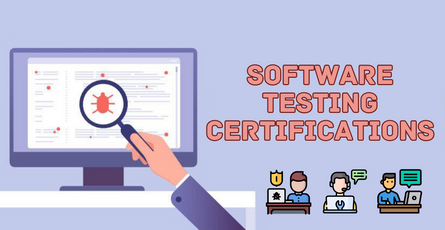Unveiling the Top 8 Scrum Certifications of 2024: Is Your Agile Career Ready?
-
 Rohan Dua
Rohan Dua
- Feb 12, 2024
-
 Certifications
Certifications
- 05 Mins read

Introduction
In our fast-paced world, where change happens within moments, not months, and certainly not years, Scrum has emerged as a dynamic approach to project management. Recognized as one of the most agile frameworks, Scrum enhances productivity and delivers practical customer value. As the demand for knowledgeable Scrum professionals continues to surge, choosing the right Scrum certification becomes crucial for those aiming to excel in project management or elevate their skills. This comprehensive guide explores various Scrum certifications, their significance, and offers insights into choosing the best one for your unique career path.
Understanding the Agile Landscape
The business landscape has undergone a significant transformation, and agility has become a cornerstone of success. Agile methodologies, with Scrum at the forefront, enable organizations to adapt swiftly to change, fostering collaboration and delivering value iteratively.
The Role of Scrum Masters in Project Management
Scrum Masters play a pivotal role in implementing Scrum methodologies. They facilitate communication, streamline processes, and ensure teams adhere to agile principles. Organizations increasingly value Scrum Masters, recognizing their ability to navigate the complexities of modern business.
Top Scrum Certifications in 2024
Certified ScrumMaster (CSM)
Certification Provider: Scrum Alliance
Demand: High, with increasing adoption of agile methodologies
Eligibility: Two-day CSM® training by a Certified Scrum Trainer
Cost: $405 - $695
Benefits: Thorough understanding of Scrum principles, enhanced leadership and communication skills, increased employability
Popularity: Widely recognized and sought after
Difficulty: Considered accessible with proper training
Average Salary: $100,000 - $130,000
Website: CSM from Scrum Alliance
Certified Scrum Product Owner(CSPO)
Certification Provider: Scrum Alliance
Demand: Significant, as organizations focus on delivering value through products
Eligibility: Two-day CSPO® training by a Certified Scrum Trainer
Cost: $399 - $780
Benefits: Comprehensive understanding of the Product Owner role, prioritization skills, effective collaboration
Popularity: Highly regarded in the agile community
Difficulty: Approachable with mandatory training
Average Salary: $101,459
Website: CSPO Certification
Professional Scrum Master (PSM)
Certification Provider: Scrum.org
Demand: High, aiming to assess knowledge and skills comprehensively
Eligibility: No specific prerequisites for PSM™ I, recommended good understanding of Scrum principles
Cost: $150
Benefits: Strengthened facilitation and coaching skills, enhanced career prospects
Popularity: Popular for assessing Scrum master skills
Difficulty: Requires awareness of Scrum concepts
Average Salary: $100,500
Website: PSM
Advanced Certified ScrumMaster (A-CSM)
Certification Provider: Scrum Alliance
Demand: Growing as organizations adopt agile methodologies
Eligibility: Active CSM® certification and completion of A-CSM℠ training
Cost: $1000 - $2000
Benefits: Specialized skills for overcoming challenges, strengthened coaching abilities
Popularity: Sought after for advanced skills
Difficulty: Designed for experienced Scrum Masters
Average Salary: $100,000 - $130,000
Website: Advanced Certified ScrumMaster
Professional Scrum Product Owner(PSPO)
Certification Provider: Scrum.org
Demand: Increasing as organizations value certified product owners
Eligibility: No strict prerequisites, recommended understanding of Scrum principles
Cost: $200 for PSPO I; advanced levels available
Benefits: Showcase ability for accurate product delivery, advanced techniques for maximizing product value
Popularity: Popular among product owners for strategic product development
Difficulty: Requires basic knowledge of product ownership principles
Average Salary: $104,000
Website: Professional Scrum Product Owner
SAFe Scrum Master Certification
Certification Provider: Scaled Agile, Inc.
Demand: Rising with increased adoption of SAFe for large-scale agile implementations
Eligibility: No specific prerequisites; SAFe Scrum Master course recommended
Cost: $600 - $1099
Benefits: Understand Scrum Master role in SAFe, organize program-level events, implement Scrum in large-scale environments
Popularity: In demand for SAFe transformations
Difficulty: Tests knowledge of SAFe® practices
Average Salary: $97,319
Website: SAFe Scrum Master Certification
PMI-Agile Certified Practitioner (PMI - ACP)
Certification Provider: Project Management Institute (PMI)®
Demand: Growing across various industries
Eligibility: Agile project management experience and formal training in agile practices
Cost: $435 for PMI members, $495 for non-members
Benefits: Knowledge of various agile methodologies, enhanced career prospects in agile project management
Popularity: Respected among project managers for upskilling
Difficulty: Tests knowledge of different agile methodologies
Average Salary: $123,000
Website: Agile-acp
Scrum Master by Scrum Inc. Certification
Certification Provider: Scrum Inc.
Demand: Gaining traction among professionals seeking authentic Scrum learning
Eligibility: No specific prerequisites; certification training or alternative means
Cost: Varies by training provider; certification can be obtained through alternative means
Benefits: Acquire knowledge from Scrum co-founder Dr. Jeff Sutherland, understand core principles and best practices
Popularity: Gaining popularity for learning directly from a Scrum co-founder
Difficulty: Tests practical knowledge and insights from Dr. Jeff Sutherland
Average Salary: $59,000 - $120,000
Website: Scrum Master by Scrum Inc. Certification
How to Choose the Right Scrum Certification
Aligning Certifications with Career Goals
Identify your career aspirations and choose a certification that aligns with your desired role in agile projects. CSM® or PSM™ may be ideal for Scrum Masters, while CSPO® or PSPO suits Product Owners.
Considering Experience Levels
Assess your experience with Scrum and agile practices. Choose certifications based on your experience level, as some may have prerequisites or recommended levels of expertise.
Evaluating Certification Providers
Research the reputation and credibility of certification providers. Opt for certifications offered by well-known organizations with a strong track record in the agile community.
Importance of Training Opportunities
Look for certifications that offer valuable training opportunities. Attending workshops led by experienced trainers provides practical insights and prepares you for certification exams.
Cost and Accessibility of Scrum Certifications
Consider the cost of certification and the availability of training courses in your region. Evaluate if the investment aligns with your budget and schedule.
Industry Recognition and Specialization
Check if the certification is widely recognized and valued in your industry. Some certifications may also specialize in certain aspects of Scrum, aligning with specific job roles.
Certification Renewal and Community Support
Understand the renewal requirements for certifications. Being part of the agile community through forums, events, and networks provides ongoing support and knowledge exchange.
Becoming Scrum Certified: A Step-by-Step Guide
Understanding Scrum Fundamentals
Before pursuing certification, ensure a solid understanding of Scrum fundamentals. Online resources, books, and introductory courses can help build this foundation.
Choosing the Right Certification
Based on your career goals and experience, select a certification that aligns with your aspirations. Consider prerequisites, training requirements, and the certification provider's reputation.
Participating in Training Workshops
Enroll in training workshops conducted by certified trainers. These workshops offer a deeper understanding of Scrum principles, real-world scenarios, and valuable insights.
Gaining Hands-on Experience
Apply Scrum principles in real-world projects to gain practical experience. Hands-on involvement enhances your understanding and prepares you for the challenges of agile projects.
Preparing for the Exam
Use study materials provided by certification providers and additional resources. Practice exams and quizzes help reinforce your knowledge and boost your confidence.
Registering and Taking the Exam
Follow the certification provider's guidelines to register for the exam. Most exams are conducted online, allowing flexibility in scheduling.
Achieving and Maintaining Certification
Upon passing the exam, celebrate your achievement. Stay engaged with the agile community, participate in forums, and continuously update your skills to maintain your certification.
Resources and Study Materials
Explore a variety of resources, including books, online courses, and forums. Staying informed about the latest trends and practices ensures you remain a valuable asset in the agile community.
Maintaining and Renewing Scrum Certifications
Continuing Education and Professional Development
Stay updated with the latest developments in Scrum and agile practices. Attend conferences, webinars, and workshops to continue your education.
Practical Experience and Recertification Exams
Accumulate practical experience by actively participating in Scrum projects. Some certifications may require recertification exams or ongoing professional development to renew.
Community Involvement and Networking
Engage with the agile community through online forums, local meetups, and conferences. Networking provides opportunities to share experiences and learn from others in the field.
Staying Informed and Setting Reminders
Set reminders for certification renewal dates and stay informed about changes in the agile landscape. Regularly check for updates from certification providers and industry publications.
Conclusion
In conclusion, the pursuit of a Scrum certification is not just about adding a credential to your resume; it's a commitment to embracing agile principles and continuous learning. As you navigate the Scrum certification landscape, consider your career aspirations, experience levels, and industry trends. Choose a certification that aligns with your goals, and embark on a journey of becoming a certified Scrum professional. By doing so, you position yourself as a valuable asset in the dynamic world of agile project management, contributing to the success of your organization and advancing your own career.


